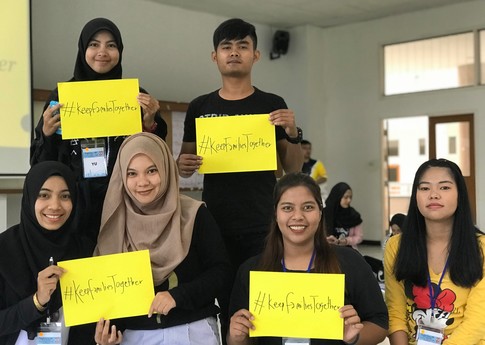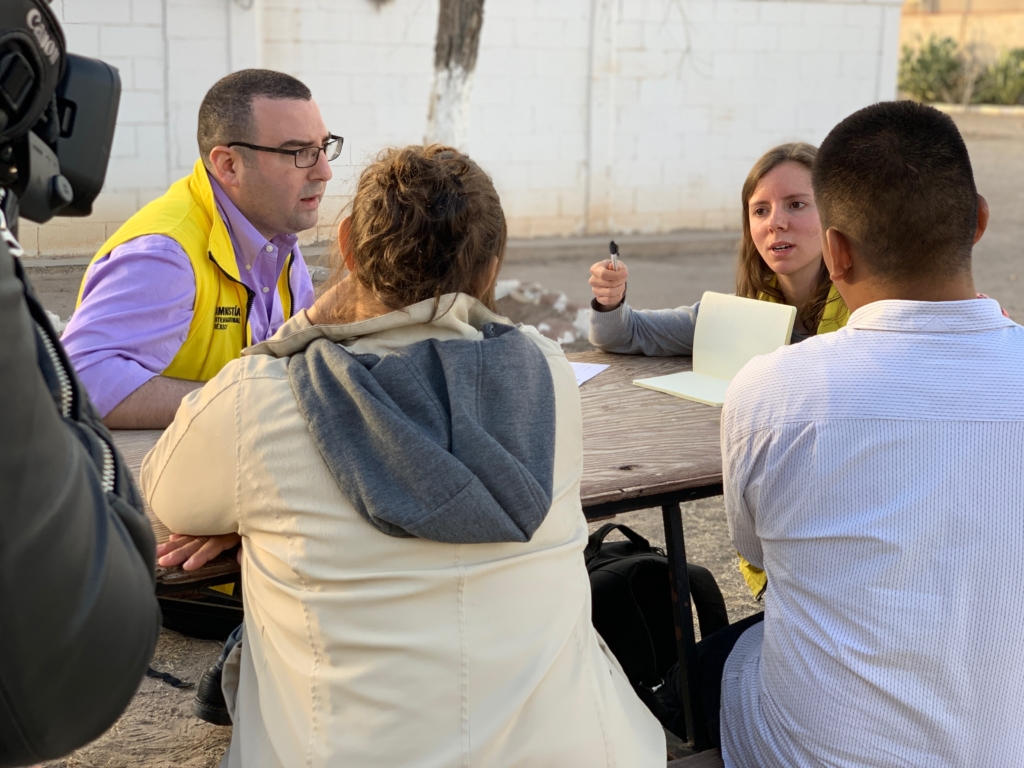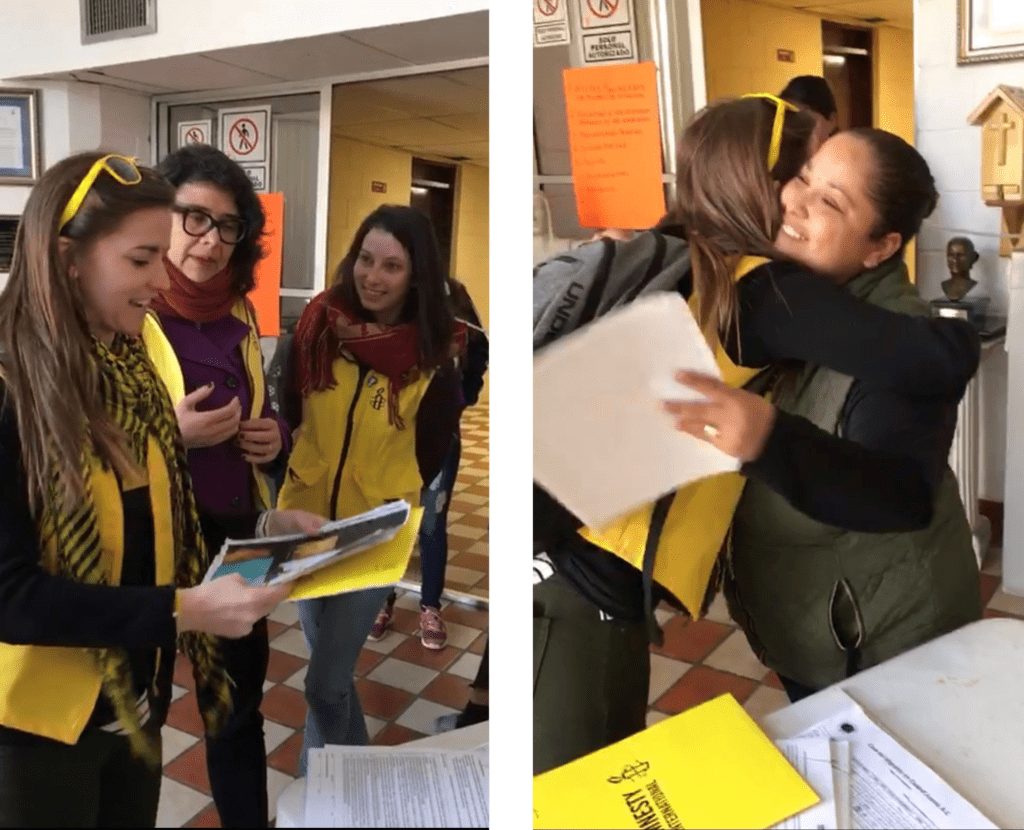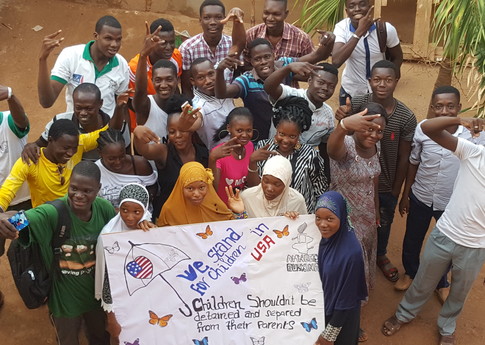In 2017 and 2018, the Trump administration in the USA separated thousands of migrant families at the USA-Mexico border. Children were ripped away from their parents and housed in shelters around the country, unsure of if and when they would be freed and reunited. Parents were locked up in detention centers, sometimes unable to contact their children.
In response, the global Amnesty International Human Rights Education program mobilized to educate and activate. In classrooms around the world using materials provided by Amnesty International, students learned about the awful policy and practice of family separation at the USA-Mexico border. Then, from Senegal to Kenya to Venezuela and beyond, the students sent messages of love and solidarity to the thousands of migrant children who were suffering as a result of the Trump administration’s outrageous immigration policies.

Fast forward seven months: In January 2019, an Amnesty International delegation visited the USA-Mexico border to document the conditions that people face when they try to seek asylum in the USA. The border trip affirmed what Amnesty International research has previously documented: The Trump administration is defying international law and manufacturing a crisis at the border. It is implementing policies that have already caused—and continue to cause– catastrophic and irreparable harm to thousands of people.
The Amnesty International delegation toured shelters for asylum seekers on the Mexican side of the border, where migrants are forced to stay after border agents refuse them entry in the USA. These families are turned away from the official border crossings (called “ports of entry”) back into Mexico and forced to wait for weeks or months before being allowed to request asylum, sometimes in perilous and insecure situations. For many asylum seekers – especially children and families, or LGBTI people – waiting in Mexico can be terribly dangerous.
Casa del Migrante is one of those shelters in Ciudad Juarez, Mexico. The delegation had a chance to visit and witness the heartbreaking reality of families waiting to enter the USA. The shelter typically houses around 65 families. It was heavily guarded by tall walls, a thick gate, and a guard. Kids as young as 3 years old ran around playing soccer, older teens sat on benches, mothers tended to and breastfed their babies. There were teenage boys joking around, sharing snacks, patiently waiting. There was a toddler learning how to ride a tricycle. Everyone was wearing a plastic bracelet with a number on it. Those numbers indicated their places in line to seek asylum in the USA that would be called one day by Mexican and US immigration officials.
The delegation met families from Cuba, Honduras, Guatemala, and more, who told the group of how they had fled persecution and unimaginable violence.

Similar to the Mexican border town of Tijuana, at the shelter in Ciudad Juarez there was a spiral-bound notebook with the names of asylum seekers listed with numbers assigned to each—the same number as the one on each person’s bracelet. Government officials gave the shelter notice when the would call the next few numbers of people who have permission to approach the border port of entry. The idea of the notebook to meter asylum seekers had become so normalized that one might forget that it is entirely illegal. In fact, USA border agents have an obligation to let asylum seekers cross the border to present their asylum claims on the spot, and it is illegal under international law to push them back into Mexico where they could be in danger without receiving their protection requests.
Human rights and migrant solidarity groups told the delegation that USA officials dropped off busloads of migrants, either deported to Mexico or pushed back at the border, in downtown Juarez almost every day. Sometimes there were 50 people, sometimes 200. The border communities scramble to take care of them but they can’t always account for everyone, and people slip through the cracks — they disappear entirely or are kidnapped and sometimes even killed by organized crime. An asylum lawyer told the group that five of his clients have been murdered in Juarez in the last few years.
At the shelter, Mexican police vans and cars pulled up outside the guarded gate. A loudspeaker started blaring numbers deafeningly loud in Spanish. Some people rushed to gather their families and possessions and form a short line to exit. Their numbers had been called.
For the delegation, it was surreal to watch, and one couldn’t help but wonder if those in line knew just how cruel and unforgiving the US immigration system could be— how they could have their children taken away from them, or be locked up in detention indefinitely as they await the adjudication of their asylum claims. Do they know these things could happen? Is it still worth it? Border groups told Amnesty International that most people have no idea what to expect – they just know what they absolutely cannot go back to, and they’re not always safe in Mexico.

Spanish-speaking Amnesty International staff spoke to the people whose numbers had been called. “Oh, you’re all with Amnesty?” asked one woman in line, waiting her turn to load into the police van. “I sign all of your petitions,” she said, smiling.
Before leaving, Amnesty International representatives hand-delivered the letters of solidarity from school kids around the world to the shelter coordinator (pictured). She promised to give the letters to the children in the shelter and expressed her gratitude and appreciation.
Families and other people on the move, like those in the shelter, are trying to rebuild their lives. Many are desperate and frightened for the future. The USA government’s practices of putting people in harm’s way, especially those who have lost everything, goes against their basic human dignity without compassion, and in many cases violates USA and international law.
Thank you to all of the schools, teachers, and students who contributed letters that were delivered to the shelter. Unfortunately, the practices of family separation, detention, and border pushbacks continue today, so our work is not over, but the letter handover at the shelter was a powerful reminder that solidarity knows no borders.


